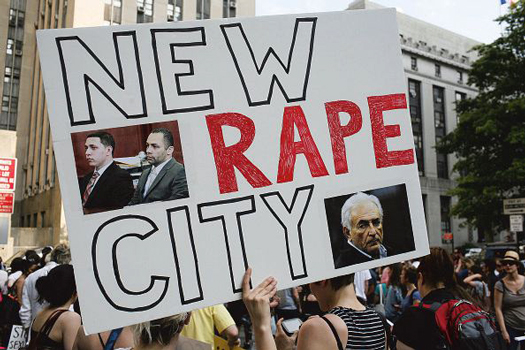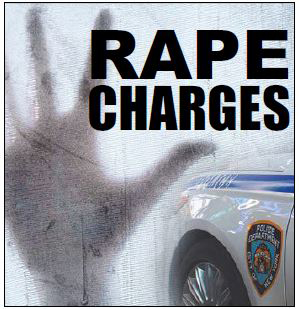Accusations raise questions about problem of sexual abuse and policing
By Barrington M. Salmon -Contributing Writer- | Last updated: Nov 10, 2017 - 10:29:59 AMWhat's your opinion on this article?

Angry citizens stage a quickly organized demonstration outside the courthouse the day after two New York City police officers had been acquitted of charges of raping an intoxicated women after helping her to her apartment from a taxicab. Officer Mata was charged with rape, while his partner, Officer Moreno kept look out. Even though the two officers were videotaped visiting the women’s apartment three times in one evening, and lied to their superiors about where they were, the jury said that the lack of physical evidence in the case required a not guilty verdict. Both police officers were fired from the police department. Photo: Getty Images
|
The recent indictment of two undercover police officers from the New York Police Department on first-degree rape charges is bringing what advocates and critics say is past due attention to a problem that has long lingered in the shadows.
The pair, Richard Hall and Eddie Martins, pled not guilty to charges that they sexually assaulted a then-18-year-old woman last year. According to published reports, the 50-count indictment— which includes rape, sexual assault and kidnapping—stems from the victim, Anna Chambers. The victim alleges that on Sept. 15, she was arrested for possession of cannabis and an anti-anxiety drug, then the detectives drove her to a nearby car park. She asserts that she was handcuffed and Mr. Martins violently raped her, then she was sexually assaulted by both officers.
In most cases, victims are too afraid to come forward. Ms. Chambers filed a complaint against her alleged attackers.
A Nov. 2 story in The Intercept by Natasha Lennard notes that a rape kit test at the hospital detected DNA from the officers, and that Ms. Chambers’ lawyer said his client told him that two witnesses saw her being put in the police vehicle. The officers admitted having had sexual contact with Ms. Chambers but insisted that the sex was “consensual.”
The idea of such a statement, is on its face absurd, because of the power dynamic at play, said retired Seattle Police Chief Norm Stamper.
“The nature of the relationship between sworn, uniformed officers and a member of the public, the power difference makes consent in this case questionable and very unlikely,” said Mr. Stamper who was in law enforcement for 36 years, the last six years in Seattle, Washington as chief. “A lot of people are terrified to report these incidents because of fear of retaliation. My sense of this is that it’s a troubling problem. I don’t know a single police department of any size that has been spared.”
“It’s a very real problem. Any department that believes that it’s free of the threat is fooling themselves. It’s a very serious problem and more common than they think. Our obligation in this regard is a very special one, from screening, to testing, to background checks, education training and supervision.”
Chief Stamper and Drs. Philip Stinson and Timothy Maher said that they were surprised that two officers are alleged to have committed this crime because most times officers don’t want anyone to find out what they’ve done.
“A part of the problem is that power and authority give some the opportunity to prey on vulnerable people,” said Dr. Mayer, a professor at the University of Missouri- St. Louis. “A small percentage of officers go out and do this. It’s very unusual for two or more officers to do this. This is one of the main reasons officers lose their jobs. It’s only one or two percent but that’s still a lot of officers.”
A quirk in New York law says that sex between an arresting police officer and a detainee may not necessarily be rape. That hole in the law is being addressed by New York Councilmember Mark Treyger who is presenting a legislative fix.
There appears to be no clear consensus among law enforcement experts and researchers about the pervasive nature of sexual assault in the ranks of the police. Dr. Stinson, a professor at Bowling Green State University and the principal investigator for a Department of Justice-funded research project on police integrity about sexual assault by police officers, said: “It goes on with some regularity in some places” and is far more common than the public thinks.
One of the difficulties is that research and data on this problem is scant, although Drs. Stinson and Maher have headed or participated in studies and conducted research which is helping to illustrate the fingerprint of the scourge.
Critics castigate the NYPD for its penchant to be fiercely protective of officers involved in crimes, including sexual harassment and other sex crimes, its willingness to smear and discredit complainants and its resistance to criticism, change or any significant form of accountability.
Police sexual assaults are called “the hidden crime,” one unseen and rarely discussed. Chief Stamper, who began as a beat cop in San Diego in 1966, said police officers and officials hide behind “the blue wall, are insular, cultivate a culture of silence, and exploit the imbalance of power which other critics contend are two legs of a systemic, institutional form of oppression.”
In 2015, the Associated Press found that over a six-year period, about 1,000 police officers had lost their badges for committing sexual assault which includes rape and sodomy; sex crimes that included possession of child pornography; sexual misconduct such as propositioning citizens or having consensual but banned sex on-duty.

|
One officer, Daniel Holtzclaw of the Oklahoma City Police Department, went on trial that year for allegedly raping 13 Black women while on duty. He was found guilty in December 2015 of multiple counts of rape, sexual battery, forcible oral sodomy and other charges and sentenced to 263 years behind bars.
Journalist Steve Yoder encapsulated the problem that persists and continues to ensnare society’s most vulnerable: Black women and women of color, teens, members of the LGBTQ community and those involved in the sex trade.
“Stories of cops propositioning, harassing, and sexually assaulting women turn up every week around the country,” he wrote in a March 2013 story titled, “Cops Gone Wild.” “February 18 saw the arrest of Houston officer Victor Chris for allegedly telling two women he would tear up their traffic tickets in exchange for sexual favors, according to the Houston Chronicle. Police charged Sergio Alvarez, an officer from West Sacramento, California, on February 25 with allegedly kidnapping and raping six women while on duty. On March 1, Denver cop Hector Paez got eight years in prison for driving a woman he’d arrested to a secluded spot and forcing her to perform oral sex.”
The indictment of cops Martins and Hall comes against the backdrop of a national awakening, tortured discussions and a cascade of often lurid accusations from female and some male victims who have called out powerful Hollywood producers, directors and actors, men on television, radio and newspapers, social media and elsewhere about their sick, predatory behavior.
Lt. Sonia Wiggins Pruitt said she is tired of the persistent, insidious and toxic environment created by those who engage in sexually harassing behavior.
“I’m appalled both ways, as a police officer and a woman,” said Lt. Pruitt, a 25-year law enforcement professional who is with the Montgomery County, Md., Police Department. “We’re trusted to protect but officers are in a position to abuse their authority. It’s the underserved who are most often affected, Black and Brown people. And the word of the officer holds more weight.
“As a woman, I’m pretty sick of how we’re treated like sexual toys. In our world, women have been subjected to sexual harassment, rape and other abuses. The White House and Trump’s friends and buddies have created an atmosphere that this can happen. They’re emboldened.”
Lt. Pruitt recounted a sexual harassment incident. A lieutenant who was directly responsible for her unit came up to her and two other officers, walked up to a female corporal, flipped the badge that she wore on her chest and told her he needed to see her in his office.
“She looked like she was about to pass out,” Lt. Pruitt recalled. “She came back and said she was tired of what he was doing to her. She was never explicit about what he did to her though. A couple of weeks later, he came up to me, put his arm over my shoulder and told me how good I looked.”
“I told him you can’t touch me and he acted surprised. I told him if he did that to me or anyone else, I was going to report him. To have someone who is your superior do that makes your heart beat faster, makes you want to pee in your pants. This is someone you’re supposed to trust.”
Lt. Pruitt said the problem affects the entity of the criminal justice system.
“What if this was their mother or sister?” she said. “They objectify us, see us as objects to be disposed of. I’m a firm believer that police departments are a reflection of leadership. If they’re lackadaisical, the rank-and-file will be too. Often, it’s about towing the blue line. You have to change things by changing things at the top.”
Chief Stamper said the way officers act is a function not just of the culture, but also the power they wield which makes them feel as if they can do what they want.
“It’s an arrogance that afflicts too many officers,” he said. “It causes them to believe that they’re above the law. What we’re facing from institutions in Seattle, San Diego, the NYPD is an undercurrent of racism and abusive practices that lead to excessive force, lethal force and sexual predation.”
“I’ve made the case in my new book, ‘To Protect and Serve: How to Fix America’s Police,’ that it’s time to restructure the institution,” he explained. “You hear about bad apples but it’s time to recognize that if we continue to have these incidents and call them bad apples, we need to look at the barrel. The very structure and organization of police departments is dysfunctional.”
A paramilitary, bureaucratic structure stands in the way of meaningful reform, he said, necessitating the re-engineering of a new culture.
“We need radical reform, meaning fundamental change, restructuring from the ground up, turning things upside down. I try to be honest and respectful but it does no one any good for the system. Unless and until we’re willing to give people control and put them in the driver’s seat nothing will change,” Chief Stamper concluded.
INSIDE STORIES AND REVIEWS
-
-
About Harriett ... and the Negro Hollywood Road Show
By Rabiah Muhammad, Guest Columnist » Full Story -
Skepticism greets Jay-Z, NFL talk of inspiring change
By Bryan 18X Crawford and Richard B. Muhammad The Final Call Newspaper @TheFinalCall » Full Story -
The painful problem of Black girls and suicide
By Charlene Muhammad -National Correspondent- » Full Story -
Exploitation of Innocence - Report: Perceptions, policies hurting Black girls
By Charlene Muhammad -National Correspondent- » Full Story -
Big Ballin: Big ideas fuel a father’s Big Baller Brand and brash business sense
By Bryan Crawford -Contributing Writer- » Full Story






 Click Here Stay Connected!
Click Here Stay Connected!








